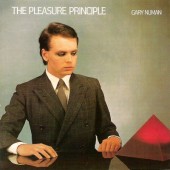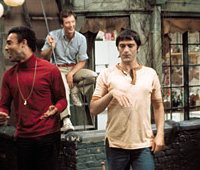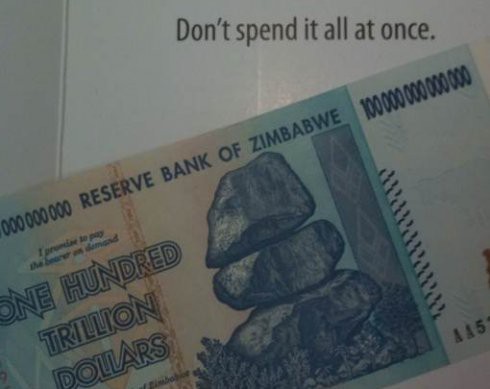Booked Up, with Seth Colter Walls: An Incredibly Un-Fun Misreading of David Foster Wallace that...
Booked Up, with Seth Colter Walls: An Incredibly Un-Fun Misreading of David Foster Wallace that Katie Roiphe Should Never Do Again
by Seth Colter Walls

Have you ever loved a writer or book real hard? So hard that when someone got her or him-or it-all wrong, it was like you’d just been gutted? Well, then: the Katie Roiphe essay, from this weekend’s New York Times Book Review.
There are some things to admire here. Chief among them is her argument that a lot of contemporary dude fiction is pretty flaccid stuff. Consider all those fish effectively barrel-shot. And I’m also on board for championing the virtues of erotic ecstasy that are there to be found in mid-century dude fiction. This is less-obvious ground to be treading, these days. (And yes, even if it was mannered and self-conscious in its time, and can look stale today, the “virility” of Mailer, Updike et al remains a legit-if-narrow form of erotic ecstasy. Not for everyone: but different blowjobs for different folks, etc.) Though really now: David Foster Wallace does not belong in an essay about the droopy-dicked tendencies of Benjamin Kunkel and Jonathan Safran Foer.
In the parenthetical where she first mentions Wallace’s review of a late-period Updike novel, Roiphe writes: “(Recounting one such denunciation, David Foster Wallace says a friend called Updike ‘just a penis with a thesaurus’).” Now, if one were using this as a piece of evidence with regard to Wallace’s ostensible pivot, sexytime-wise, away from all things Updike may have ever stood for, here might be a good point to ask does Wallace himself subscribe to this view that he has quoted? Hell, let’s just go look at the page in question, from Consider the Lobster, via Amazon.com’s “look inside this book” feature.
This bit, halfway up the page from the “penis/thesaurus” line, is hardly useful for Roiphe’s clean division between old and new male lit stars: “… I’d like to offer assurances that your reviewer is not one of those spleen-venting spittle-spattering Updike haters one often encounters among literary readers under forty…. I do believe that The Poorhouse Fair, Of the Farm, and The Centaur are all great books, maybe classics.” Point… incoherence? Certainly not Point Roiphe.
It’s not the only time Roiphe mis- or under-reads Wallace’s Updike essay (or Infinite Jest, either).
She writes: “In this same essay, Wallace goes on to attack Updike and, in passing, Roth and Mailer for being narcissists. But does this mean that the new generation of novelists is not narcissistic?”
Let’s return to the Wallace essay Roiphe wants to summarize. Is it true that Wallace fails to note or distinguish the narcissism of a past era versus the narcissism of the present one-such that it’s appropriate for a gotcha transition in an overbroad trend piece?
No. Just no. Here’s Wallace again, in the same essay, which runs all of eight pages (and is therefore not his most difficult work for readers to bear the responsibility of completing): “But I think the deep reason so many of my generation dislike Updike and the other GMN’s [Great American Narcissists] has to do with these writers’ radical self-absorption, and with their uncritical celebration of this self-absorption both in themselves and in their characters.” (Emphasis added, since it seems like an important, qualifying word.) Wallace expands on the difference between different generational approaches to narcissism on the next page, when he writes:
But young adults of the nineties — many of whom are, of course, the children of all the impassioned infidelities and divorces Updike wrote about so beautifully, and who got to watch all this brave new individualism and sexual freedom deteriorate into the joyless and anomic self-indulgence of the Me Generation-today’s subforties have very different horrors, prominent among which are anomie and solipsism and a peculiarly American loneliness: the prospect of dying without even once having loved something more than yourself.
This is all much more complex than Roiphe gives it credit for being, perhaps because she’s too busy shoehorning Wallace into a fraternity of lesser writers with whom he does not belong. I doubt even Eggers himself-who wrote a self-deprecating intro to the 10th anniversary edition of Infinite Jest-would put his Roiphe-pilloried novel You Shall Know Our Velocity! up against either of Wallace’s. And I say that as someone who likes Eggers in general, disliked his first novel, and is looking forward to opening, eventually, that grandly (if unsustainably-conceived) newspaper that is McSweeney’s 33. (I mean, just to make my point a little more overt: my dream, as a currently single person, is that I could share the different sections of McSweeneys 33 over a pot of coffee with a smart woman on some soon-to-come lazy Sunday morning. And then after passing it back and forth for a couple of hours, we’d go have hot sex. Because I’m pretty sure that would be an ecstasy I’m not at all “too cool” to admit wanting as a twenty-nine-year-old.)
Just for completeness’s sake, the other Wallace quotation Roiphe uses, from Infinite Jest, runs like this: “He had never once had actual intercourse on marijuana. Frankly, the idea repelled him…. “
Now-aside from the question “how about when not on marijuana?”-it should be said that Infinite Jest is a long book, featuring many characters who use all manner of drugs. So at first I wondered if this was Hal being disgusted by the idea of doing it on weed, or maybe his pal Pemulis. Turns out this line is from the opening section on Ken Erdedy. The guy who smokes so much pot that we re-meet him hundreds of pages later in a halfway house. This is not a fair shot at the putatively sexless literary kids these days. It’s not even a representational view of the erotic as it works in Infinite Jest. Also, for what it’s worth: this line occurs on Page 22 of the book, and describes a rather minor character.
If you can tolerate the most vague of Infinite Jest spoilers, I’ll say that, hundreds of pages later, you can see Don Gately take some very decisive, hero-type action that you would be hard-pressed to square with Roiphe’s blanket line: “Even the mildest display of male aggression is a sign of being overly hopeful, overly earnest or politically unÂtoward.” (Greater earnestness, as it happens, is a virtue that Wallace pushes most of the sympathetic characters in Infinite Jest toward.) And, while being transported to the hospital after the incident in question, the fact that Gately has enough presence of mind to sneak a peek underneath Joelle Van Dyne’s veil: there’s simply nothing sexless about this moment. Or about the film-within-the-novel that gives the book its title (along with Hamlet, obvs).
These plot elements do what Roiphe rightly celebrates Updike et al for doing when they are at their best-”These passages are after several things at once-sadness, titillation, beauty, fear, comedy, disappointment, aspiration.” In fact, I’d go so far as to say that if you don’t get lustfully moved by Gately’s desire for Joelle Van Dyne, or if you fail to understand her equal and abiding desire to get it on with Gately as she exhorts their fellow addicts to help her drag him to the car already-it might just be the case that you, the reader, have yet to get properly did in the bedroom.
As a side-note: Before one stays up all night writing something like this instead of sleeping, it might be useful to ask, “When is a much-celebrated writer worth sticking up for? More people love and respect Wallace’s writing than will ever know my name, or likely Roiphe’s. So who cares?”
When it comes to someone like Mailer, it always seems silly to take up a collection for his defense-since, in his own books and essays, he takes up his own cause pretty reliably. Though it is obviously different with a writer like Wallace. Self-aggrandizing beef isn’t really present as an ingredient in his journalism or his fiction. He was brave and brainy-one could even say virile-as a writer. Plenty of his sentences wow men and women alike with their hyper-endowment on the level of porny 48WTF?-cup tits or 12-inch cocks.
And this is why I suppose I care. Despite all his literary physiognomy, Wallace wasn’t the kind of brawling dick-swinger to go around saying “Who’s the champ? Who’s the champ? I’ll take on all comers” all the time. And just because this wasn’t the case doesn’t somehow make him a writer who is “too cool” for eroticism, as Roiphe wants to claim. Wallace may have been a (merciful) break from the primping pageantry of a prior era’s literary bodybuilding, especially when compared to your average “imma drop 1,000 pages in yo face” novelist. But, contra Roiphe, Wallace was also a lover, even through the pharmacological fog of his treatments for depression-which included, at various points, electro-shock. (Also? I’ve heard in commercials that even the lower-wattage approach to managing depression can sometimes mess with a person’s sexual drive, at times? But maybe we can let this one go.)
Seth Colter Walls writes for Newsweek.
You're Damn Right There's A G-Spot

Ya hear about that study out of Kings College London which claims that there’s no such thing as “the G-spot”? “The elusive erogenous zone said to exist in some women may be a myth, say researchers who have hunted for it.” Lemme tell ya something, ladies: That study is bunk.
Here’s the deal: Not only does the G-spot exist, it is very easily found. What the researchers failed to note, perhaps because they didn’t ask the right people, is that there are certain folks who are WAY BETTER at finding it than others. And you know who I’m talking about. A study conducted over a period of several years by me shows that when the G-spot explorer comes from a certain cluster of categories-ethnically both Italian and Jewish, quick with a deprecatory remark, displaying a remarkable ability to turn any bit of faux-scientific news into material for a blogpost no matter how hackneyed the joke, 5’9″, piercing brown eyes, dark-complected, of depressive tendencies, showing little regard for fashion or ironing, averse to exercise, jittery and dyspeptic-there is 100% success in G-spot location, often several times in the same session. That’s right, I got yer magic G-spot finder RIGHT HERE. [Clutches crotch.] Thank you for your attention.
New Video: Big Boi and Gucci Mane, "Shine Blockas"
What do you do if you record a great duet with a big rising star in your field, but he has to go to jail before filming a video for it? Well, if you’re cooler than a penguin’s toenails, like Outkast’s Big Boi, you head to Walmart to pick up some new socks, set the cameras rolling, and lip-synch your partner’s parts for him. And give a little “Free Gucci” shout-out at the end.
God. Along with earlier advance tracks “Royal Flush” and “Something’s Gotta Give,” “Shine Blockas” has me downright giddy about the prospects for Big Boi’s long-delayed but soon-upcoming solo album, Sir Luscious Leftfoot. He’s the best. Wait. Do penguins even have toenails? Oh. Sure they do. Talons, I guess you’d call them, but still.
Critic: Regular Models Not Chubby, Homely Enough
“They may be women from real life, but they are not ugly or fat.”
-The fashion critic for Germany’s Frankfurter Allgemeine Sonntagszeitung is unimpressed by women’s magazine Brigitte, which has vowed to only use amateur models in its pages from now on. While Brigitte’s editors claim that the policy is aimed at curbing anorexia and providing more realistic images of women, detractors see it as “effectively a PR campaign aimed at boosting the magazine’s falling circulation of just under 700,000.”
"Show me a happy homosexual and I'll show you a gay corpse."

You know what we needed most of all, in the year 2010? A revival of The Boys in the Band. Thuper! It opens February 21! Let us turn the clock back to 1968, when Clive Barnes wrote in the Times: “As the conventional thing to say about Mart Crowley’s ‘The Boys in the Band’ will be something to the effect that it makes Edward Albee’s ‘Who’s Afraid of Virginia Woolf?’ seem like a vicarage tea party, let me at least take the opportunity of saying it first.” Duly noted. And 1969, the headline: “’The Boys in the Band’ Is Still a Sad Gay Romp.” And 1970: “THE BOYS IN THE BAND” has just entered its third year at Theater Four on West 55th Street, and the damndest thing has happened to it. It has become a period piece.” Other interesting Times pieces on the same subject: “More Homosexuals Aided To Become Heterosexual,” February 28, 1971.
Press Release of the Day: Daters Must Love Dogs!

Press release of the day! “The world’s very first dating site for dog lovers celebrates its fourth birthday today. Founded on 3rd January 2006 by Derek Collinson, a Scottish entrepreneur with a passion for dogs, it is now home to thousands of single dog lovers looking to meet someone who shares their love of man’s best friend. Derek explains ‘There are an estimated 40 million million single dog owners in America alone who find it difficult to meet other singles who don’t mind sharing their lives with dogs and all that entails (no pun intended).’… And to celebrate its fourth birthday www.doglover.biz is offering new members a free 7 day trial!” Must love dogs, etc.
Worthless Money Has a Price Now

Best holiday card of the year: the one from (Chicago-based and Objectivist-believing!) CapitalistPig Asset Management, who sent out defunct Zimbabwean currency. Actually, the firm sells the bills, for a rather unreasonable price, as their value is probably something near zero. They also sell t-shirts. (Would you get your portfolio evaluated by a firm that bothered to sell t-shirts? I personally would not. Your mileage may vary.) Keep in mind that, not long before the currency was suspended, an egg cost $50 billion of these “dollars.”
The End of the 00s: All of The End of the 00s
by The End of the 00s

We are both in awe of and profound debt to everyone who contributed to our End of the 00s series. I know how much you love it when I get earnest, so I’ll just keep it brief and say that we were overwhelmed by both the willingness of so many people to provide these pieces and the quality of the material they gave to us. Anyway, because of the vagaries of the holiday weekends and our brilliant idea to switch servers in the middle of a gigantic, ongoing project, it’s a pretty fair bet that you missed at least one of the 49 essays in the series. Here’s a list of every single one of them, which we encourage you to dip into at your leisure; there is almost certainly something here for everyone. Enjoy.
A Guide to the Unmonuments of New York, by Joy Garnett
A Party In Iran, by Kaila Hale-Stern
A Personal Chronology of the Last Decade Organized Around My Blackouts, by Rod Townsend
Augustine’s Second Cat, by Julie Klausner
Bad for Humanity, but Great for Horror, by Melissa Lafsky
Buffy, Season Five, Episode 22, ‘The Gift’, by Dan Kois
Chains of Fools, by Maura K. Johnston
Decade of Suck, by Regina Schrambling
Down Under the George Washington Bridge Overpass, by Matthew Gallaway
Everybody in His or Her Own Life Needs a Hobby, by Matt Ealer
Family Business, by Cord Jefferson
Hope You Enjoyed Your Brush With Rock ’n’ Roll, by Leon Neyfakh
Horrible Decade of Constant Terror Doesn’t Officially End Until the World Does, In 2012, by Ken Layne
How To Lose Your Idealism In Under Ten Years, by Natasha Vargas-Cooper
Imagined Responses to Four Emails That I Sent, To Which I Have Not Yet Received a Reply, 2000–2009, by Juli Weiner
Is Three Still A Trend?, by Josh Wimmer
Listicle Without Commentary: The 348 Best Reality Television Shows of the 00s, In Order, by Jon Caramanica
Made in New York, by Joel Johnson
Me Me Me, By the Numbers, by Logan Sachon
New Year’s Eve and the Rise of the Machines, by Richard Lawson
No One Would Have Blamed Her For Changing Her Mind, by Dan Shanoff
Noted, Without Noteworthiness, by Rob Walker
Personal Statements, by Luke Mazur
So Lax, by Katie Bakes
Ten Years of Best Picture Suck, by Zachary Woolfe
The Ballad of That Guy From Titus Andronicus (As Told To Matthew Perpetua)
The Best Hoaxes of the Decade, by Val Temple
The Bonds, by Troy Patterson
The Counterfactual 00s, by Rudolph Delson
The Coup, by Eric Spiegelman
The Dance-Off Decade, by Lindsay Robertson
The Debt Regret Matrix, by Jessanne Collins
The Decade In “Netflix Instant Watch,” by Alex Pareene
The Decade in Super Squats, by Hamilton Nolan
The Experience of Dishonorable Debates, by Seth Colter Walls
The Guantanamo Gift Shop, by Spencer Ackerman
The Hollywood Crowd, by Ken Wheaton
The Hunt for lonelygirl15, by Richard Rushfield
The Life of the Party, by Doree Shafrir
The Most American Person of the Decade, by Kaila Hale-Stern
The Most Disturbing Sense Of Gratitude, by Dave Bry
The Naughts: A Progression, by Regina Nigro
The Night We Sneaked Into the Center of the World, by Adriane Quinlan
The Stupid Kids of 1999, by Will Leitch
Tiny Moments of Varying Significance, 2000–2009, by Amy Jean Porter
Top 10 Jobs I Lost This Decade: Failing Up, Sometimes, but Mostly Sideways, by Jackson West
What I Know Now, by Abe Sauer
When the Geeks Took Over, by John Sellers
Why Did We Not Appreciate 2007?, by Sara Vilkomerson
Explaining Metropolitan Diary

“Sometimes when I read Metropolitan Diary items on Mondays, I don’t necessarily ‘get it’ because they involve people I don’t have anything in common with and don’t feel like understanding,” writes someone today, who has chosen to spend the morning grappling with meaning in this most-aged of newspaper columns. “I’ve read it six times now and can’t make any sense of it. And I love sarcasm!” Actually, we can help!
The item goes like this.
“DEAR DIARY:
Recently on a beautiful day, I was walking south on Fifth Avenue. The street was very crowded, and while we were waiting for the light to change at 49th Street, the woman behind me said in a distinctly British accent, “I wonder where the diamond district is.”
I thought I would be helpful, and turned around and said, “Oh, that’s on 47th Street.”
Her male companion replied in an equally distinctive British accent, dripping with sarcasm, “Well, thanks a lot.”
J. J. Levine”
Even a careful reader will have to slow down and visit this item a few times to discover why it is “charming” or “humorous.” The joke, you see, lies in the understated presence of gender.
The woman, you see, is wondering where the diamond district is. Why does she wonder this? Because she enjoys diamonds, as all members of her sex do, and would most likely prefer to own some and/or more of them.
She is traveling with a male companion, who, in his statement to the writer, reveals implicitly that he is not just her traveling companion but most likely her spouse or at least lover. There are two implications in this:
1. At the very least, he will now be forced to spend his afternoon accompanying her as she looks at diamonds, which is beneath him, or irritating to him, or simply boring to him.
2. Most likely, however, the implication is that he will be forced or persuaded or manipulating into the purchase of diamonds by his female partner. Because women do not have money of their own, and are dependent upon the income of men, and because they also frequently withhold sex in exchange for goods, he has been put in a difficult position by the revelation of the location of the diamond district.
This is very very humorous! Most likely because presumably the deeper joke is that the woman’s dowry was not extensive enough to provide for the purchase of very many diamonds. She is not worth as much in diamonds as her father paid the man to marry her! Unfortunately, the writer is not inquisitive enough to convey how much cattle the woman was worth at the time of her marrying-off. But, yes, like I said: very humorous!
Oscar Season: Those Whiny Snobs/Tin-Eared Populists Will/Will Not Salute 'Avatar'
• The D Beast: “Another lock for an Oscar nomination…. the Academy has always had a tin ear when it comes to what a good script is. It’s Crash and Star Wars rolled into one. How could it not be nominated?”
• NY Mag: “We still don’t see the King of the World reigning on another Oscar night…. While it may be true that only whiny snobs are still complaining about Avatar’s extravisual shortcomings, it’s worth noting that the Academy’s current membership is comprised primarily of whiny snobs.”
